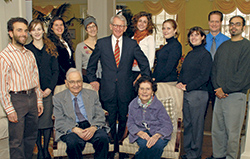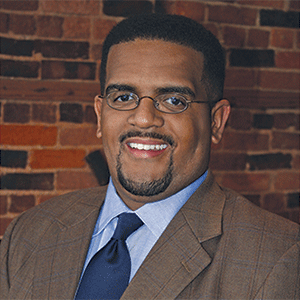A Blueprint for Success
Weiss Fellowship prepares students for real world

Charles and Shirley Weiss (seated), Charleston Mayor Joseph Riley, Jr. (standing middle) and the 2008 Weiss Fellows celebrate the 15th Anniversary of the Weiss Urban Livability Program.
More than 15 years ago, Professors Emeriti Charles and Shirley Weiss had a vision — bringing together graduate students from across Carolina to explore how quality of life issues could make a difference for them and for society. The Weiss Urban Livability Program, which has funded over 130 graduate students across a diverse spectrum of disciplines, is a testament to the Weiss’ vision and to their dedication, as professors, mentors and friends, to several generations of Carolina students.
One of the individuals who benefitted from the Weiss’ generosity is Conaway B. Haskins III, Deputy State Director for United States Senator Jim Webb of Virginia. As a master’s student in City and Regional Planning in 2000, Haskins was awarded a Weiss Fellowship. Haskins was surprised by the honor and grateful for the support.
“Honestly, I was elated,” Haskins says. “I had heard about the Weiss Fellowship during the application process, but I never thought I would get it because there were so many talented people in Carolina’s graduate programs. Also the money really came in handy — I was able to avoid ramen noodles!”
As with every class of Weiss Fellows, Haskins was part of an interdisciplinary team of graduate students charged with designing a project to benefit the local community. For Haskins’ class, it was a case study of the innovative Southern Village, which had just begun construction in Chapel Hill.
“The community was still a work-in-progress, but seeing this emerging real estate trend up close stuck with me, particularly being a City and Regional Planning student,” Haskins says. “The biggest challenge was navigating the diverse and distinct personalities and finding my own voice within the group.”
The experience left an indelible mark on Haskins and helped prepare him for his future career. Before joining Senator Webb’s staff, Haskins, a self-described citizen-journalist, maintained a popular blog, “South of the James,” and was an active presence in Virginia politics. Haskins’ work with the Weiss Fellows was a natural extension of his interest in public policy and community service.

“What always struck me about the Weisses was their fearless approach to thinking of what the future would bring,” says Conaway Haskins, a 2000 Weiss Fellow.
“The experience taught me a great deal about paying attention to my surroundings, especially the built environment, and emphasized the need to be open to change,” Haskins says. “Although I have not been a ‘traditional’ urban planner, issues of livability and quality of life have permeated nearly every professional and civic experience I have had since graduating from Carolina — from being a policy researcher at the Aspen Institute to my work as a grant-maker at the Cameron Foundation, right up to my current job with a United States Senator.”
The interdisciplinary structure of the program taught Haskins the importance of compromise in solving difficult community issues — a skill that would prove invaluable in the give-and-take world of politics.
“We had social workers, engineers, planners, historians and such, who each approached the issues from very different perspectives,” Haskins says. “The group was diverse by any measure: race, age, gender, life experience, etc. It probably reflected the ‘real world’ more than any other experience I had in graduate school.”
For Haskins, Professors Charles and Shirley Weiss are role models for a life dedicated to helping others. As benefactors, the Weisses have led the way in support of interdisciplinary study at Carolina. As professors, they have been mentors to hundreds of students. Along the way they have never lost their love of the arts or their commitment to Carolina and the University community.
“What always struck me about the Weisses was their fearless approach to thinking of what the future would bring,” Haskins says. “Although they retired from active teaching, they were still very engaged with the University and the broader intellectual community around the issues they cared about. It was clear from the outset that they were committed to passing on their knowledge while learning from the experiences of younger folks in the program.”
Eight years on, Haskins’ appreciation is still evident.
“I would like to thank the people who afforded me this honor,” Haskins says. “I hope that I have made them proud.”
The vision of Charles and Shirley Weiss and the ability of alumni like Haskins to make a difference in the world is something for which the University can always be proud. • J. Todd Brantley


